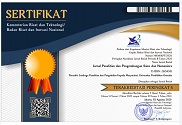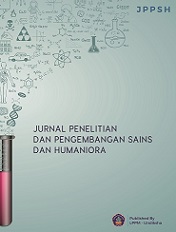Economic Factors and Performance of Selected Quoted Consumer Goods Manufacturing Companies: The Moderating Roles of Firm Agility
DOI:
https://doi.org/10.23887/jppsh.v8i2.83742Keywords:
Economic factors, Performance, Consumer goods, Manufacturing companies, NigeriaAbstract
The problem of this study is the significant decline in the performance of consumer goods manufacturing companies, which is caused by various economic factors such as import policies, inflation, infrastructure, interest rates, and exchange rates. This study aims to evaluate the impact of economic factors on the performance of publicly traded consumer goods manufacturing companies and test how corporate agility moderates this relationship. The study employed a cross-sectional survey design with a population of 5,625 employees from 12 companies, yielding a final sample of 563. Data was collected through a questionnaire validated by confirmatory factor analysis and measured by a Likert scale. Data analysis was conducted with multiple regression using SPSS version 22.0. The results show that economic factors significantly affect firm performance, and firm agility significantly moderates this relationship. The conclusion of this study suggests that consumer goods manufacturing companies need to improve their agility to overcome the negative impact of economic factors. This study implies the need for more adaptive and flexible management strategies to enhance firm performance in the face of dynamic economic challenges.
References
Abulela, M. A. A., & Harwell, M. M. (2020). Data analysis: Strengthening inferences in quantitative education studies conducted by novice researchers. Educational Sciences: Theory and Practice, 20(1), 59–78. https://doi.org/10.12738/jestp.2020.1.005.
Acerbi, F., & Taisch, M. (2020). A literature review on circular economy adoption in the manufacturing sector. Journal of Cleaner Production, 273, 123086. https://doi.org/10.1016/j.jclepro.2020.123086.
Afolabi, A., & Laseinde, O. T. (2019). Manufacturing sector performance and economic growth in Nigeria. International Conference on Engineering for Sustainable World, 13(3), 1–8. https://doi.org/10.1088/1742-6596/1378/3/032067.
Akkaya, B., & Qaisar, I. (2021). Linking Dynamic Capabilities and Market Performance of SMEs: The Moderating Role of Organizational Agility. Istanbul Business Research, 0(0), 0–0. https://doi.org/10.26650/ibr.2021.50.961237.
Al-Romeedy, B. S. (2019). Strategic agility as a competitive advantage in airlines-Case study: Egypt Air. Journal of the Faculty of Tourism and Hotels-University of Sadat City, 3(1), 1–15. https://mfth.journals.ekb.eg/.
Al Taweel, I. R., & Al-Hawary, S. I. (2021). The mediating role of innovation capability on the relationship between strategic agility and organizational performance. Sustainability (Switzerland), 13(14), 1–14. https://doi.org/10.3390/su13147564.
Arici, T., & Gok, M. S. (2023). Examining Environmental Turbulence Intensity: A Strategic Agility and Innovativeness Approach on Firm Performance in Environmental Turbulence Situations. Sustainability (Switzerland), 15(6). https://doi.org/10.3390/su15065364.
Asante, D., Ampah, J. D., Afrane, S., Adjei-Darko, P., Asante, B., Fosu, E., Dankwah, D. A., & Amoh, P. O. (2022). Prioritizing strategies to eliminate barriers to renewable energy adoption and development in Ghana: A CRITIC-fuzzy TOPSIS approach. Renewable Energy, 195, 47–65. https://doi.org/10.1016/j.renene.2022.06.040.
Butt, J. (2020). A strategic roadmap for the manufacturing industry to implement industry 4.0. Designs, 4(2), 1–31. https://doi.org/10.3390/designs4020011.
Dewi, V. I., Tan Lian Soei, C., & Surjoko, F. O. (2019). The Impact of Macroeconomic Factors on Firms Profitability (Evidence from fast moving consumer good firms listed on Indonesian stock exchange. Academy of Accounting and Financial Studies Journal, 5(1), 23–39. http://hdl.handle.net/123456789/9396.
Ehiedu, V. C., & Toria, G. (2021). Audit indicators and financial performance of manufacturing firms in Nigeria. Linguistics and Culture Review, 6(July 2021), 14–41. https://doi.org/10.21744/lingcure.v6ns1.1887.
Elali, W. (2021). The Importance of Strategic Agility to Business Survival During Corona Crisis and Beyond. International Journal of Business Ethics and Governance, 1, 1–8. https://doi.org/10.51325/ijbeg.v4i2.64.
Felicia O. Olokoyo, O. W. I., & Babajide, A. (2020). Macroeconomic indicators and capital market performance: Are the links sustainable? Cogent Business & Management, 7(1), 1792258. https://doi.org/10.1080/23311975.2020.1792258.
Gyemang, M. D., & Emeagwali, O. L. (2020). The roles of dynamic capabilities, innovation, organizational agility and knowledge management on competitive performance in telecommunication industry. Management Science Letters, 10(7), 1533–1542. https://doi.org/10.5267/j.msl.2019.12.013.
Ikechukwu, F., Amobi, V., & Kingsely, U. (2023). Economic Environment and the Performance of Small and Medium Entreprises (Smes) in Nigeria. Advance Journal of Business & Entrepreneurship Development, 7(02), 57–77. https://aspjournals.org/ajbed/index.php/ajbed.
Jibrin Musa, S., Moses, K., & Ejura Success, B. (2022). Effect Of Leverage On Profitability Of Information And Communication Technology Companies Listed On The Nigeria Stock Exchange. Journal of Positive School Psychology, 2022(6), 10386–10393. https://www.journalppw.com/index.php/jpsp/article/view/9665.
Leal Filho, W., Kovaleva, M., Tsani, S., Țîrcă, D.-M., Shiel, C., Dinis, M. A. P., Nicolau, M., Sima, M., Fritzen, B., Lange Salvia, A., Minhas, A., Kozlova, V., Doni, F., Spiteri, J., Gupta, T., Wakunuma, K., Sharma, M., Barbir, J., Shulla, K., … Tripathi, S. (2023). Promoting gender equality across the sustainable development goals. Environment, Development and Sustainability, 25(12), 14177–14198. https://doi.org/10.1007/s10668-022-02656-1.
Maralutua, J. T., & Pulungan, N. A. (2022). Inflation, Interest Rate, and Exchange Rate for their Effect on Profitability and the Implications on Corporate Value: Case Studies in National Banking 2014 until 2019. Journal of Economics, Finance and Accounting Studies, 4(1), 263–279. https://doi.org/10.32996/jefas.2022.4.1.18.
Moslehpour, M., Chau, K. Y., Tu, Y.-T., Nguyen, K.-L., Barry, M., & Reddy, K. D. (2022). Impact of corporate sustainable practices, government initiative, technology usage, and organizational culture on automobile industry sustainable performance. Environmental Science and Pollution Research, 29(55), 83907–83920. https://doi.org/10.1007/s11356-022-21591-2.
Ngatno, E. P. A., & Youlianto, A. (2021). Moderating effects of corporate governance mechanism on the relation between capital structure and firm performance. Cogent Business & Management, 8(1), 1866822. https://doi.org/10.1080/23311975.2020.1866822.
Ni, G., Xu, H., Cui, Q., Qiao, Y., Zhang, Z., Li, H., & Hickey, P. J. (2021). Influence mechanism of organizational flexibility on enterprise competitiveness: The mediating role of organizational innovation. Sustainability (Switzerland), 13(1), 1–23. https://doi.org/10.3390/su13010176.
Nugroho, M. (2021). Corporate governance and firm performance. Accounting, 7(1), 13–22. https://doi.org/10.5267/j.ac.2020.10.019.
Ojeleye, Y. C., Opusunju, M. I., &Abdullahi, A. I. (. (2020). Globalisation and performance of manufacturing sector in Nigeria. Journal of Accounting and Management, 3(1), 12–18.
Okolie, U. C., & Edo, Z. O. (2023). Issues and failure of infrastructure project implementation in Nigeria. Social Sciences, Humanities and Education Journal (SHE Journal), 4(3), 580–596. https://e-journal.unipma.ac.id/index.php/SHE/article/view/18137.
Sardana, D., Gupta, N., Kumar, V., & Terziovski, M. (2020). CSR ‘sustainability’ practices and firm performance in an emerging economy. Journal of Cleaner Production, 258(10), 120766. https://doi.org/https://doi.org/10.1016/j.jclepro.2020.120766.
Siagian, H., Tarigan, Z. J. H., & Jie, F. (2021). Supply chain integration enables resilience, flexibility, and innovation to improve business performance in covid-19 era. Sustainability (Switzerland), 13(9), 1–19. https://doi.org/10.3390/su13094669.
Tuong, V., Binh, T., & Hoa, N. D. (2019). Impact of transport infrastructure on firm performance: Case study of Cuu long delta area. Vietnam. Problems and Perspectives in Management, 17(2), 51–62. https://doi.org/10.21511/ppm.17(2).2019.04.
Umair, M. (2023). Pakistan’s Struggle for Regional Economic Dominance: Analyzing Failures and Proposing Essential Policy Interventions. Journal of Public Policy Practitioners, 2(2). https://doi.org/10.32350/jppp.22.04.
Wonu, N., & Ndimele, S. C. (2021). Determination of Appropriate Statistical Procedures for Quantitative Data Analysis in Mathematical Sciencesand Educational …. Faculty of Natural and Applied Sciences …, 3(1), 19–31. https://www.fnasjournals.com/index.php/FNAS-JSI/article/view/16%0A.
Yaser ALMANSOUR, A., Mohammad ALZOUBI, H., Yaser ALMANSOUR, B., & Mansour ALMANSOUR, Y. (2021). The Effect of Inflation on Performance: An Empirical Investigation on the Banking Sector in Jordan. Yaser Mansour Almasour/ Journal of Asian Finance, 8(6), 97–0102. https://doi.org/10.13106/jafeb.2021.vol8.no6.0097.
Downloads
Published
Issue
Section
License
Copyright (c) 2024 Adedoyin Opeyemi Okusanya , Adeolu Oludare Olatoye, Taiwo Olubunmi Keinde, Adebola Ademola Adebayo

This work is licensed under a Creative Commons Attribution-ShareAlike 4.0 International License.
Authors who publish with the Jurnal Penelitian dan Pengembangan Sains dan Humaniora agree to the following terms:
- Authors retain copyright and grant the journal the right of first publication with the work simultaneously licensed under a Creative Commons Attribution License (CC BY-SA 4.0) that allows others to share the work with an acknowledgment of the work's authorship and initial publication in this journal.
- Authors are able to enter into separate, additional contractual arrangements for the non-exclusive distribution of the journal's published version of the work (e.g., post it to an institutional repository or publish it in a book), with an acknowledgment of its initial publication in this journal.
- Authors are permitted and encouraged to post their work online (e.g., in institutional repositories or on their website) prior to and during the submission process, as it can lead to productive exchanges, as well as earlier and greater citation of published work. (See The Effect of Open Access)









